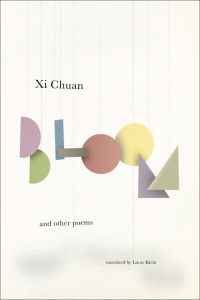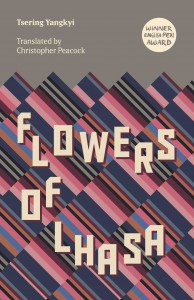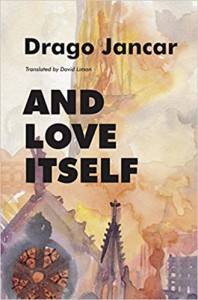In this month of highlights from the world of translated literature, we’re spotlighting three singular, wide-ranging, and immersive texts. From the Chinese, Shawn Hoo discusses the philosophical and journeying collection from celebrated poet Xi Chuan. From the Tibetan, Suhasini Patni reviews a dark, compassionate novel of womanhood and urbanity from Tsering Yangkyi. And from the Slovenian master Drago Jančar, Eva Wissting gives a look into his latest novel, on how personhood and identity survive the ravages of war.

Bloom and Other Poems by Xi Chuan, translated from the Chinese by Lucas Klein, New Directions, 2022
Review by Shawn Hoo, Assistant Editor
In the title and opening poem of Xi Chuan’s (西川) Bloom and Other Poems, a simple verb like “bloom” begins lyrically and unsuspectingly enough—
if you’re going to bloom then bloom to my rhythm
close your eyes for one second breathe for two be silent for three then bloom
—but in the course of its exuberant and exacting repetitions across six pages, the action soon blossoms into a sophisticated geometry. At times, the verb seems to indicate an instructive concern for those new to the world (“bloom a pear blossom in case the nape of your neck is cold”). Other times, we hear the speaker issuing something of an injunction or a dare: “bloom / unleash a deep underground spring with your rhizome.” In a poem structured around insistence (to borrow Gertrude Stein’s understanding of how repetition works), Lucas Klein—who also curated and translated Xi Chuan’s Notes on the Mosquito—constructs a resonant architecture, allowing the echoes to bounce off the pages’ acoustics, often to rhapsodic effect: “bloom barbaric blossoms bloom unbearable blossoms / bloom the deviant the unreasonable the illogical” and later: “bloom three thousand boundless universes / and string up and beat any beast that refuses to bloom.”
In English, though not in Mandarin, bloom sits uncomfortably close to blood; in this titular poem, this simple word—across both languages—operates with an undertone of violence, belying its vivacious exhortations until the end, ending up as a verb that has swelled beyond its initial premise. The poems that come after “Bloom” all seem to share this restless inflation of the poetic image and line, each taking the verse to its various geometric limits, upon where it strains to meet other worlds.
How to think about these other worlds? Firstly, perhaps, in terms of genre. “Bloom” might very well be the most straightforwardly lyrical poem in the collection (and even then, the lines I’ve quoted already cross into manifesto)—an incantatory opening that frames the rest of the collection. This reference point is perhaps much needed, since the following poems start to take on other extra-poetic genres: from the more recognisable travelogue (“Travel Diary”), to a scattered series of haphazard realisations (“Random Manhattan Thoughts”), and a compilation of aphoristic sequences (“Loquaciousness, or: Thought Report”). Throughout, Xi Chuan harnesses both the suggestive power of the fragment and the system of the long poem to create something at once poetic and essayistic. The seventh entry of the prose-poetic “Travel Diary,” for example, deploys narrative and loosely follows the speaker’s journey from car, seaside, town, market to finally reach the city, but:
This city avoids me. It gives me rainstorms, so I can’t walk around outside. The museum I’d heard about has closed due to staffing issues. In the store people say things I can’t understand. They only sell one kind of liquor at the store, the kind I can’t drink. Stomach rumbling, I find a restaurant, but it’s closed. I complain loudly, but no one cares. I knock on the side door in the alley and it opens, but no one’s inside. I lean on a tree and the leaves fall. I don’t know anyone in this city. Coming to this city, it’s like I never got here.
Even outside of its narrative structure, the poem conveys the traveller’s thoughts through the very negation of their presence and gaze. His eyes are not allowed to rest on any specific sight, no speech is legible to him, and even the diary he keeps is devoid of geographical specificity. Each of these seventeen enigmatic prose fragments are densely allegorical and exist between genres; to quote from Xi Chuan’s own report, indicative perhaps of his stylistic attempts—“Attempted: great lyricism, minor lyricism, great narrative, minor narrative.”
Included in this bilingual collection is a transcript of the Xi Chuan’s conversation with the media personality Xu Zhiyuan, titled “This Era Should Not Be Wasted,” and the dialogue reveals much about the poet’s own ambitions. In discussing the various tumultuous transformations of the Chinese language, Xi Chuan’s resistance to working explicitly in the Tang and Song lyric tradition (exemplified by Du Fu or Su Dongpo) and the political sloganeering of China’s eighties has instead pushed him to feel closer to the writers in the Warring States period (c. 475–221 BC), a turbulent time of war and social upheaval that also birthed the Hundred Schools of Thought, as well as thinkers as varied as Kongzi (Confucius), Mozi, Han Fei, and Zhuangzi:
At the age teeth go bad I fall in love with the old-man philosophy of the Hundred Schools of Thought and the starry skies of the Warring States.
I know the dead aren’t quiet, but they’re a little better when they’ve been gone two thousand years. (“Annoyances”)
What he admires in these masters of poetry—although the contemporary reader might shelve them under philosophy—is that they were “working through their own era.” In this sense, Xi Chuan’s attempts to touch other worlds of genre are also attempts to touch the world.
Straightforwardly, the poems here often exert to take on Xi Chuan’s own era. They have the whiff of historical testimony, from the changing fates of the relationship between China and the United States (“Chinese people in magua opposing despotism in 1911 and Chinese people in Mao coats spending US dollars in 1979 and Chinese people in business attire gnawing on stewed duck in 2000”) to the Arab Spring (“History ended once in 1989, and now it’s ending again in 2011”) to the vagaries of the ongoing pandemic (“All right, all right, I won’t sneeze, I won’t cough, I’ll wait a whole month before sneezing or coughing”)—made all the more poignant in the current lockdowns across China. They display a poet who is unafraid of the temporal specificity that might tarnish the future relevance of his poems, of a poet who finds the material of his own contemporary world a fertile ground in an era of tense geopolitics, in a world thick with history.
But there is a more subtle way of “working through [one’s] own era” in Xi Chuan’s work, available in the poems that serve as philosophical portraits of various human lives the poet glimpses. There is the man who finds himself swept by the overarching winds of history in “The One Who Happened”—a laconic but poignant portrayal of a contingent man who “happened to have not heard of Hitler, that guy with a little moustache who avoided him for nineteen years. / He happened to have not heard of the Cultural Revolution, and looked at himself in the mirror in a positive light.” This is precisely the kind of man who “wastes his era,” who allows circumstance and contingency to determine the shape of his life: “He has experienced a second-rate happiness, and happened to be encouraged by the spring breeze.”
Then, there is the person who does not fall into the historical conditions of heroism and drama, and is instead killed by the banality of a micro-organism (“The Man Who Was Killed By a Cold”). In one of many moments of aphoristic wisdom that capture the predicament of the contemporary artist, Xi Chuan contends: “Failed artists and poets change the world. / Artists and poets who do well usually end up reformed.”
Bloom and Other Poems is a finely curated and translated collection of poems, powerfully exhibiting a poet’s philosophical and poetic stamina. In mining the depths of a single word, conceit, or even of history itself to simultaneous completion and depletion, Xi Chuan rewards those who come out on the other side of each poem with new orientations and disorientations—confluences that perhaps this era has not even begun to understand it needs.

Flowers of Lhasa by Tsering Yangkyi, translated from Tibetan by Christopher Peacock, Balestier Press, 2022
Review by Suhasini Patni, Editor-at-Large for India
These days there are so many young women coming from the country to find work then disappearing without a trace. What is the cause of all this? I’m afraid I do not know. But this mundane world is one of samsaric existence, and always will it be so.
Flowers of Lhasa is undoubtedly a dark book; in rapid waves of bleakness, it narrativizes samsara—the Buddhist and Hinduist notion of life as a cycle of suffering, without any meaningful beginning or end. Set in Barkhor, the incense-filled public square situated within the heart of Lhasa, the episodic details the harrowing lives of women defiled by the city, and their invasive periods of false hope.
Flowers of Lhasa is only the second Tibetan book written by a woman translated into English, and the author, Tsering Yangkyi, is already well known for her coming-of-age tales exploring cultural clashes between the city and countryside. Translator Christopher Peacock, previously interviewed on the Asymptote blog, transitions seamlessly from the third-person narrative to the folkloric sayings that color the text, abetting Yangkyi’s charmingly complex writing style.
The book opens with the story of Butri. Her business, Butri Tibetan Restaurant, was once packed with happy strangers, but is now frequented only by “old men who had returned from near-defunct businesses and neighborhood idlers with barely two pennies to rub together.” Despite the financial constraints, she refuses to go back to the countryside, preferring rather to strive in the city. In an attempt to change her stroke of bad luck, she invites a rich businessman for dinner, asking Drölkar, a young and impressionable woman from her village to serve him.
When Drölkar first came to the city, she worked as a dishwasher, earning only three hundred yuan a month. However, her expenses—her father’s medicines, the construction of her family home, her brother’s education in Beijing—demand a much higher income. As Butri tells her that serving a rich man would change her life, Drölkar has still yet to be so physically close to a man, nor does she have experience drinking alcohol. Still, “she had the ominous feeling that something terrible was about to happen.” That night, her innocence and naivety was destroyed; beer was forcefully guzzled down her throat, she is groped and raped, and ultimately, she realizes that her “pure untouched body” is “tarnished” forever because of Butri’s betrayal.
Butri’s malicious act is only one of the many pedestrian tragedies in a city that swallows up its poor women. “Brazen, self-centered city folks” are unaware of the secrets tucked in narrow, seedy alleys, or of the shame proliferating in the bodies of those hardened by the fast-moving urbanity. Though Butri’s story is not told in detail, it too is distinctly marked by betrayal. As a young woman working as a maid, Butri was violated by her male employer. Humiliated by his wife, she was thrown out without the five years’ worth of wages she was entitled to; wanting to remain in the city and ensure her own survival, the perpetuation of this disturbing cycle needed another to suffer the same fate.
Though Drölkar runs away, she cannot escape what has happened. When she eventually changes her name to Dahlia, the superficial renewal instead appears as a discarding of innocence, paramount to survival. When we meet her again, she is a lipstick wearing, chain-smoking, confident woman accompanied by men who drive her around and buy her expensive clothes.
When women from the countryside come in search of luck and prosperity in Lhasa, time becomes helplessly liquid, like a leaking tap. Time runs out both for Butri who can no longer rely on her looks to bring customers to her establishment, and for Drölkar whose childhood is forcefully stripped away. The central plot of Flowers of Lhasa, however, isn’t fixated on Butri or Dahlia’s story, but on samsara and bad karma. We are introduced to Yangdzom, who leaves the same village where Dahlia grew up to work as a maid in Lhasa. She is discomforted by the strange eating habits of her employers, gushes at their spotless mansion, and silently observes the troubles that ensue between her employer, Ms. Drölma, and her daughter. “In the country it’s all about quantity, but here in the city, we value flavour, presentation, and fragrance above all,” she is told. It is no coincidence that a sentence about food rings equally true to how women’s bodies are consumed. As in the title of the novel, when women are equated to flowers, they are newly defined by the perfume clinging to their skin, their flamboyant clothing, and voices exuding their facile confidence.
Ms. Drölma starts to quarrel frequently with her husband, and accuses Yangdzom of stealing money. Unable to take it any longer, Yangdzom escapes without collecting any wages. The only person she knows in Lhasa is Drölkar, who comes to rescue her with the “haughty” attitude of an “urbanite.” She inducts Yangdzom into her cramped room and her job as a hostess in a bar called Rose, where other vulnerable girls come to earn money, and introduces her to Magnolia, another beautiful Tibetan girl from the countryside, and Cassia, a Han Chinese woman known to be “stingy” but also “humble and diligent.” Though Yangdzom is taken aback by their profession, she recognizes that all these women “harboured deep troubles” and hid their pain “inside a mask of smiles.” Despite not wanting to work at Rose, the same fate that had once befallen Drölkar recurs, and she too loses her innocence by force. Yangdzom realized: “You can’t avoid your karmic lot, just like you can’t wipe the wrinkles off your forehead.” Eventually, she joins the women as a hostess and changes her name to Azalea.
Christopher Peacock, most well-known for his translation of Tsering Döndrup’s A Handsome Monk, beautifully reproduces the uniqueness of the city and the haunting experiences of the characters into English. Having presented Döndrup’s fiction as a site to challenge dominant perceptions of Tibet, his translation work similarly urges one to read an unfettered, unfurled picture in Tsering Yangkyi’s. Both the romanticized view of a gentle Tibet or the perceptions of its rural backwardness are at odds with the Flowers of Lhasa; focusing on the lives of impoverished women in contrast with the denigrative view that “any woman who sells her body” is “an animal with no heart, no shame, no self-respect, and no sense,” Yangkyi presents a significant, yet rarely explored aspect of Tibetan society.
In Buddhism, actions or karma from one’s previous life affects the present, and all beings suffer from samsara until they find liberation. There is no beginning or end—there is only release from ignorance. These “sisters” of the “same karma” never try to fix the unfixable; instead, they meet their pains with compassion. Towards the end of the book, Azalea runs into Butri, who now dons the clothing of a nun, chants her manis, and sweeps endlessly. Though Azalea feels turmoil and hatred, she is caught off guard by Butri’s act of repentance, and instead of confrontation, hands her money. In explicating acceptance as a way to recognize one’s spiritual potential, Azalea is moved by the nun’s quiet prostrations, and both are enveloped in a feeling of love.
Although stories of survival in a big city are common—especially ones of women forced into prostitution—the exceptionality of Yangkyi’s writing lies in how she binds Lhasa and samsara into her narrative. Her captivating, immersive writing is a rare offer, gifting us a fascinating and singular glimpse into the burgeoning talent of modern Tibetan writing.

And Love Itself by Drago Jančar, translated from the Slovenian by David Limon, Dalkey Archive Press, 2022.
Review by Eva Wissting, Editor-at-Large for Sweden
In his latest novel to be translated into English, Slovenian writer Drago Jančar depicts the horrors of war with an intricate web of physical violence, psychological terror, and the cruelty of randomness. Starting with a photograph of two young girls in a Solvenian street during the late summer of 1944, the book’s four chapters go on to closely follow various different characters and their disparate experiences of the war, as their paths merge and intersect.
Sonja, one of the two girls in the photo, recognizes an SS officer, Ludek—who these days prefers to think of himself as Ludwig. Taking a chance in hopes that Ludek can help her detained boyfriend Valentin, Sonja makes a decision that will drastically affect all three lives in the following year.
Three years prior, the Slovenian town Maribor had fallen to the Third Reich, and was renamed Marburg and der Drau. Having long been a large German-speaking minority in this area, many welcomed the Nazis when they arrived. Nevertheless, a resistance movement developed in the hills outside Maribor. In order to survive—physically, mentally, emotionally—everyone has to take sides, and not just once but again and again, depending on the sporadically shifting balances of power.
It was also clear to Valentin now that for a long time it had not been about us and them, us against the Nazis, but also Slovene against Slovene, the Partisans against the Home Guard, communists against . . . who? Traitors. In White Carniola, they all spoke about the White Guard. Why white? Because the white forces had been against the red in Russia. They had been told about this on the Pohorje, but from there all this looked different, distant. Now it was all here, very close. Us or them—the Germans will go, but we will all still be here.
When the Germans take over Maribor, Valentin and Sonja are too consumed by their budding young love to pay much attention to what is happening around them, but eventually, they are forced to choose sides. Though initially going along with the general sentiment of supporting the Germans, Valentin eventually decides to switch sides, joining the resistance up in the hills. Due to an unfortunate mistake—made perhaps because he is young, or simply because he is exhausted from the war, its violence and constant uncertainty—he is caught by the SS. Sonja, upon seeing Ludek, is seized by the opportunity to help the man she loves, but unsurprisingly, what she asks for comes at a high price. Ludek, despite being unambiguously one of the narrative’s villains, is also driven by love—but in his case it’s about the love that he longs for: that of a woman, but also of comrades, and of a nation.
Early fall turns into winter, and winter into spring, as good blurs into bad, right into wrong, and the past bleeds into the present.
I no longer understand, he whispered, what is right and what isn’t, what is good and what is evil. If only Sonja would come, I would ask her, she saved me. A few years ago it was all so simple. Now it is complicated. Is it necessary to do evil to defeat evil? It is. If that is love, what she did, then that is also something terrible. If I did not have love, I am . . . what? Love is terrible. It kills. Love for the motherland? Also. That most of all.
Drago Jančar, born in 1948, is himself from Maribor and currently lives in Ljubljana. He is one of Slovenia’s most prominent writers, and his fiction, essays, and plays have been translated into over twenty languages. His 2014 novel, I Saw Her That Night (in English translation by Michael Biggins) won the Kresnik Award, and in 2011 he received the European Prize for Literature. Between 1987 and 1991, Jančar was President of the Slovenian PEN Centre and active in the democratization of Yugoslavia and Slovenia.
Like the original Slovene version of And Love Itself, David Limon’s fluid, sensitive English translation incorporates phrases and song lyrics in German. While this novel is about war, and love, it’s also a book about identity, and the story shows how language operates in molding identity. To Ludek, who prefers to be called Ludwig—the German version of his name—nothing is random about the language he chooses to use:
I attended a course in pure German. The German of Goethe, the German of Schiller. Before I went there, I was working in a printing house, every day I was dealing with language, with the printed word, so I know what language is and I know what culture is. If I wanted to get rid of my repulsive Maribor dialect, I had to do something.
But the German identity that lends him power as the Nazis are winning the war is no longer protective when they start losing. Ultimately, Jančar’s novel begs the vital questions of personhood: what is identity, and how does one human differ from another? Eventually, the physical war ends, but continues wreaking its havoc in the lives and bodies of those who lived through it. “Evil does not stop just like that, it rampages for a long time.”
*****
Read more on the Asymptote blog

